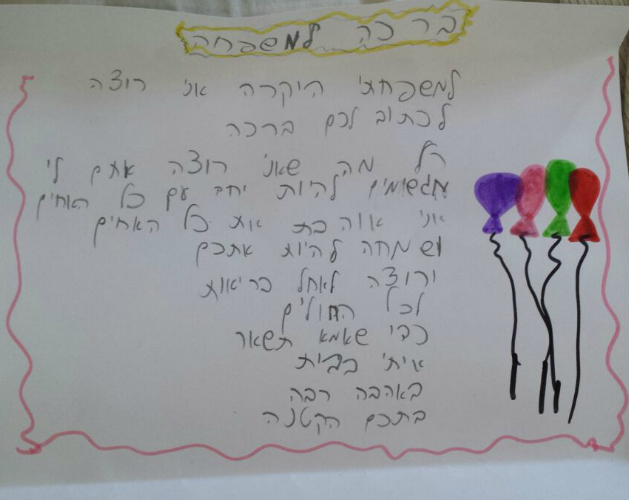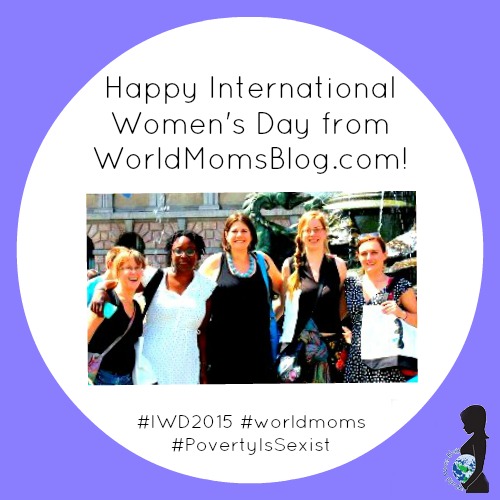
by Susie Newday (Israel) | Mar 11, 2015 | 2015, Israel, Life Balance, Parenting, Susie Newday, Working Mother, World Moms Blog, World Motherhood, Younger Children

I was blindsided.
It was Family Day, or Yom Hamishpacha, as it’s called in Hebrew. The day that somehow ended up replacing Mother’s Day here in Israel. My youngest was so proud of the card she had made for my husband and me. She had colored pictures of balloons, and had written all the words on her own.
I smiled as I read lines of “To my dear family, all the things I want you fulfill,” and, “I love my siblings and I’m happy to be with you.”
The sucker punch came at the end.
“I want to wish for health for all the sick people in the world so that my mom can stay home with me.”
Ouch. A heartfelt painful dagger to the heart. I was caught off guard. She had never said anything to me about not wanting me to work.
I work part-time, only three days a week. I’m a nurse in outpatient oncology. I do important work, fulfilling work. I work because my salary makes a difference in our finances. I work because if I don’t work, it’s that much harder to get back into it when you do want to work.
And yes, there are days when I wish I didn’t have to work. There are also many days when I’m glad I do work. Yet like every working mother, I’m constantly tormented by the demands of both worlds and with the impossibility of finding balance. I think the emotional and mental balance is even harder to find than the physical, task-related balance.
And then, when I think I’ve found that precarious balance, I get hit by innocent words, words pleading for more love and attention than I’ve been giving.
All I can do is accept what is, and try harder. Try harder to be true to my needs and to give those I love what they need.
The question is how.
Any tips?
This is a post original to World Moms Blog. Photo credit to the author.
Susie Newday is a happily-married American-born Israeli mother of five. She is an oncology nurse, blogger and avid amateur photographer.
Most importantly, Susie is a happily married mother of five amazing kids from age 8-24 and soon to be a mother in law. (Which also makes her a chef, maid, tutor, chauffeur, launderer...) Susie's blog, New Day, New Lesson, is her attempt to help others and herself view the lessons life hands all of us in a positive light. She will also be the first to admit that blogging is great free therapy as well. Susie's hope for the world? Increasing kindness, tolerance and love.
You can also follow her Facebook page New Day, New Lesson where she posts her unique photos with quotes as well as gift ideas.
More Posts - Website
Follow Me:






by shootiegirl | Mar 10, 2015 | 2015, Social Good, Womanhood, Women's Rights, World Moms Blog, World Voice

Photos by Elizabeth Atalay
This past Sunday the world celebrated International Women’s Day.
What does it mean to be a woman? For me, it means the sky is the limit. I can be a wife, a mother, a corporate woman, an entrepreneur, a philanthropist and an artist. Yes! All at the same time! Because I was raised by a woman of such strength and power, I’ve never set any limits for myself. Frankly, I didn’t even know they existed. I have always felt propelled, even at a very young age, to DREAM BIG and move beyond the status quo.
As a mother of two girls, I live my life in a way that proves to my daughters that a glass ceiling is non-existent. Who says they can’t become engineers and architects because they are female? What about an astronaut, fire fighter, dancer, fashion designer?
I often remind them that wherever their minds can take them, they can reach any of those goals and beyond. Why? Because there are no boundaries, unless they create them.
Women around the world measure happiness and success differently. Whether it’s bringing your children to school safely in a dangerous area, raising your child to dream of and follow the profession of their choice, standing up so your daughter is not married off in childhood, giving your children the support they need to do well in school, or providing food for your family by working hard at a job just to make ends meet, these are all great efforts we are making to pave the way for a better world. We all share the desire for happiness and success for our children worldwide.
I encourage you to celebrate the women around and beyond you! In order to stay empowered, we must reach out to lift another woman up. Help her to find her happiness and success!What is your idea of happiness and success?
This is an original post written by Shootiegirl creator LaShaun Martin for World Moms Blog.
What is your idea of happiness and success?

LaShaun Martin is National Director of Social Media and Community Service for Mocha Moms, Inc. a national 501(c)(3) support group for stay-at-home mothers of color. LaShaun currently works to manage and promote community service programs for the organization to include teen mentoring, Boys Booked on Barbershops literacy program, America’s Promise, MomsRising, Moms Clean Air Force, U.S. Environmental Protection Agency, and U.S. Department of Education. She is a frequent guest of the White House for events focused on women and girls including tea with First Lady Michelle Obama.
LaShaun holds a Bachelor of Science degree in Business Administration. LaShaun spent 20 years with the State of California, the State of Maryland Department of Corrections managing public education, research, FBI programs and later Hewlett Packard. LaShaun now serves as CEO and Designer of her own company, Shootie Girl™ Custom Rhinestone Apparel and Shootie Girl™ Blog – Positive Messages for Women and Girls. Shootie Girl™ designs have been featured with CNN’s Soledad O’Brien, Sherri Shepherd of The View, Carol’s Daughter, Clinique Cosmetics, Jack and Jill of America, Inc., Still Standing Movie, Dr. Sherry Blake of Essence Magazine and Aja Dantzler of R&B singing couple Kindred and the Family Soul and Blogalicious.
LaShaun is passionate about giving back and ensures her company reflects a heart for service by donating many “t-shirts for a cause” to Heart of Haiti, the women of Zimbabwe and The United Nations Foundation Shot@Life Campaign. She also serves on the Advisory Board of MOMentumNation and the Epilepsy Foundation.
LaShaun’s greatest passions are her husband, two lovely daughters and music.
Blog: http://www.shootiegirl.net
Custom Rhinestone Apparel: http://www.shootiegirl.com
More Posts

by Mirjam | Mar 9, 2015 | 2015, Cultural Differences, Netherlands, Parenting, Responsibility, World Motherhood
 My parents were born and raised in Surinam. They moved to the Netherlands in the 70’s and raised their children there. Though not completely oblivious to Dutch culture, the way my parents raised me was greatly influenced by the motherland. That includes the way chores were done.
My parents were born and raised in Surinam. They moved to the Netherlands in the 70’s and raised their children there. Though not completely oblivious to Dutch culture, the way my parents raised me was greatly influenced by the motherland. That includes the way chores were done.
In Surinam, and I’m guessing in many non-Western (“Second World”) cultures, chores are simply a part of life. They are part of a daily routine in which all family members share the responsibility of running a household. As a kid, you go to school, do your chores and play in the time that is left. Dinners are prepared together, cleaning is a joint effort and in some cases, children even help parents with their jobs. Except for that last part, this is basically the way I was raised.
My Dutch husband has been raised completely differently. Chores were the responsibility of his parents. They took care of everything and as he got older, chores were gradually given to him as a way to teach him responsibility. I must add that not all Dutch kids are raised exactly the same and that there are many varieties, but the difference between Dutch and Surinam upbringing is apparent.
One of the thoughts behind Dutch upbringing: “Let children be children, let them play. Let them enjoy childhood without too many responsibilities. The time for responsibilities will come soon enough.”
Personally this thought appeals to me yet also conflicts me. I fear that my children will become entitled, spoiled and unable to deal with responsibilities if I simply let them play.
One of the thoughts behind Surinam upbringing: “Chores are normal and necessary and help kids to become responsible independent adults. Every member of the family has to do their share, family comes before individual needs.”
Having to raise children now myself, I need to find a balance between these very different approaches. And it is not easy to find a middle ground. My husband tends to have a “Here, let me do it for you” attitude. And I have a more “I am not your maid, I will teach you to do it yourself” attitude.
I have a sense of contentment and pride when I teach my kids to do their chores independently and without complaint. But I also understand how nice it is for a child to be shielded from too much responsibility and to simply be taken care of. I want to let my kids enjoy their free time in between school, homework and sports, but I also want them to help around the house and feel like they share some of the responsibility of our household.
And so I go back and forth. Some of my Dutch friends drop their jaws or raise their eyebrows when they learn that my kids clean, vacuum, mop their rooms and scrub the toilets every weekend. And my mother will feed my guilt by asking me why I don’t let the kids help around the house more.
My background does have one distinctive benefit. When my children moan about having to do chores, I tell them about my childhood and they stop complaining immediately.
What are your thoughts about chores? Does the way you raise your kids look more like the Dutch way or the Surinam way?
This is an original post to World Moms Blog by Mirjam of The Netherlands. Photo credit to the author.
Mirjam was born in warm, sunny Surinam, but raised in the cold, rainy Netherlands.
She´s the mom of three rambunctious beauties and has been married for over two decades to the love of her life.
Every day she´s challenged by combining the best and worst of two cultures at home.
She used to be an elementary school teacher but is now a stay at home Mom. In her free time she loves to pick up her photo camera.
Mirjam has had a life long battle with depression and is not afraid to talk about it.
She enjoys being a blogger, an amateur photographer, and loves being creative in many ways.
But most of all she loves live and laughter, even though sometimes she is the joke herself.
You can find Mirjam (sporadically) at her blog Apples and Roses where she blogs about her battle with depression and finding beauty in the simplest of things. You can also find Mirjam on Twitter and Instagram.
More Posts - Website
Follow Me:



by World Moms Blog | Mar 8, 2015 | 2015, World Interviews, World Moms Blog, World Voice

Today is International Women’s Day, also known as Working Women’s Day. To honour women, we, at World Moms Blog are looking at the challenges women face around the world and want to spark a discussion what it means to be a woman in the 22nd century. We also want to use this post as a reminder of how far we’ve come in some places and how much work we still have to do in others.
We asked our fabulous contributors this question: “What are the challenges women face where you live?” and received some thought-provoking, interesting answers.
Maureen Hitipeuw (Indonesia): “Equality. In a country where patriarchy is the ‘norm’ women are still being treated as second class citizen at times and that our place is at home, raising kids, cooking. Slowly this starts to shift, and I am happy to see the changes, but I am also very concerned about the support single mothers get here. Single fathers are deemed as ‘strong hero’ while single mothers still bear the negative stigma. Happy International Women’s Day!”
Mirjam Rose (The Netherlands): “I think it is balancing kids and work in the Netherlands . Although many fathers are willing to participate in taking care of their children, the work culture makes it difficult. Most bosses still expect that men simply come to work while their wives take care of the children. And because childcare has become increasingly difficult and expensive, more women are quitting their jobs or are working part-time, making it hard to pursue any career. At the same time the government expects women to work more.”
Kirsten Doyle (Canada): “In Canada, there is still wage inequality between men and women, and women are very poorly represented in the political arena. Another big challenge that isn’t spoken of often enough is how victims of rape are treated. We live in a blame-the-victim society that is hard to fight.”
Carol (Canada): “Another Canadian problem is our missing Aboriginal women. There is a lot of institutionalized racism in Canada regarding our native peoples, and we currently have an epidemic of native girls and women who have been murdered or have gone missing, without the police/authorities exerting much effort to find them or their killers. In the most worrying example, a serial killer managed to get away with killing probably 50 women over a decade period, and the police ignored it because the women he killed were all aboriginal or transient. But because several of the witnesses were also transient/aboriginal women, including the woman who claimed to be attacked, they weren’t taken seriously.”
Aisha Yesefu (Nigeria): “From birth the woman in my country faces discrimination. Some men have beaten their wives for giving birth to girls. Others have simply abandoned their wives at hospital for giving birth to girls. Sometimes there are tears because IT’S A GIRL. In terms of education the woman is given less chance to be in school. Discriminated upon even in her home. She has to do the whole house work while her male counterpart has time to read.
Women are not allowed to do certain jobs in my country. In some parts of my country women cannot own landed properties. They cannot inherit properties even from their husband. Women in some parts, too, are forced to go through dehumanising situations when their husband’s die like drinking the water used to wash the corpse to prove they have no hand in the death of husband.”
Nicole Morgan (USA): “The glass ceiling is not invisible. Dads being applauded for parenting, ummm Hello. Watching your children is NOT babysitting. Women fielding a myriad of responsibilities remains the usual, men stepping up to responsibility is not outside of the box, but part of being a dad!”
Olga Mecking (The Netherlands): “The Netherlands is a great place for women. The fathers are very involved, the support network is huge (daycares, for example) however even then there are challenges. For example, I believe there should be a bigger spectrum of birthing choices (not restricted to natural childbirth or homebirth). While it may seem that Dutch women found their work/life balance, the truth is that they are encouraged to work part-time- not too much, not too little. Again, this may be great for some, it is not enough for others. Also, Dutch women are still expected to do the majority of household and parenting chores. And, with government cutting down on daycare allowances, more and more women decide to stay at home rather than work.”

Jennifer Burden (USA): “Equal pay is still a huge issue that affects women in my country — studies indicate that women are paid less for the same jobs as their male colleagues. Also, our maternity leave is comparatively small — 12 weeks, and it is not necessarily paid, depending on the employer. I’d like to see these changes when it comes to my daughters’ future! I also want to add healthcare — there are still women who are uninsured or underinsured in the country. And more support for programs for moms who are living below the poverty line.”
Karyn (New Zealand): “For us there is a difference between those in poverty who have a whole raft of challenges to meet, just in order to get enough food and decent housing for their children, around 25% of all New Zealand children live below the poverty line. For those who have access to more money, it’s the pressure to be everything to everyone. Especially with us lot who had our children late and are often dealing with teenagers and aging parents at a time when our careers may be also at their peak.”
Elizabeth Atalay (USA): “In the U.S., we have wage disparity, some of the lowest numbers of women in government leadership positions in the world, and major childcare issues for working mothers.”
Sarah Hughes (USA): “To play off what Elizabeth just said, I think one of the biggest challenges in the US is being a working mother. Finding reliable, safe, engaging and good childcare is so hard. We pay in childcare more than most people pay in rent/mortgage per month. I have no idea how the average family can afford it. It’s a huge financial stress on our family which then turns into emotional stress, too!”
Adwoa Gyimah (Ghana): “Access to proper healthcare for the needy is a challenge in Ghana. There are systems in place to ensure that most, if not all, pregnant women get free healthcare access, but there are lapses that makes it challenging in some parts of the country, especially in the rural areas and even some urban areas. The country has come a long way in ensuring that all children of school going age can have free basic education, but there are still children on the streets selling or helping on family farmlands to earn some income to support their families.”
Nicole Melancon (USA): “I would say more opportunities for women who want to have a career and raise a family. I feel like it is all or nothing in our country.”
Also, one of our partners, the ONE Campaign, released a new campaign called “Poverty is Sexist” today! If you do one thing today, check out ONE’s new #PovertyIsSexist campaign: .
What about you, dear readers? What challenges do women face in you part of the world? Please tell us in the comments!
This is a collaborative post organized by World Mom contributor, Olga Mecking, The European Mama. Thank you, Olga!
Image credits to World Moms Blog and The European Mama.
World Moms Blog is an award winning website which writes from over 30 countries on the topics of motherhood, culture, human rights and social good. Over 70 international contributors share their stories from around the globe, bonded by the common thread of motherhood and wanting a better world for their children.
World Moms Blog was listed by Forbes Woman as one of the "Best 100 Websites for Women 2012 & 2013" and also called a "must read" by the NY Times Motherlode in 2013. Our Senior Editor in India, Purnima Ramakrishnan, was awarded the BlogHer International Activist Award in 2013.
More Posts

by Nadege Nicoll | Mar 6, 2015 | 2015, Adolescence, Boys, Communication, Family, Home, Humor, Kids, Life, Motherhood, Nadege Nicoll, Older Children, Parenting, Relationships, USA, World Motherhood, Younger Children

At the beginning of 2014, World Moms Blog asked me to define the coming year in one word. I replied: TRINITY.
No, I didn’t think I was a goddess – although feel free to disagree. . . in 2014, I was going to be three different mothers.
I have three kids, and for the first time, each of them was in a different developmental stage. I wasn’t sure whether this was good news or sit-tight-and-ride-the-wave news. But I felt ready, I was going to tackle that motherhood business with optimism and cheers.
(more…)
Nadege Nicoll was born in France but now lives permanently in New Jersey with her family. She stopped working in the corporate world to raise her three children and multiple pets, thus secretly gathering material for her books. She writes humorous fictions for kids aged 8 to 12. She published her first chapter book, “Living with Grown-Ups: Raising Parents” in March 2013. Her second volume in the series just came out in October 2013. “Living with Grown-Ups: Duties and Responsibilities” Both books take an amusing look at parents’ inconsistent behaviors, seen from the perspective of kids. Nadege hopes that with her work, children will embrace reading and adults will re-discover the children side of parenthood. Nadege has a few more volumes ready to print, so watch this space…
More Posts - Website
Follow Me:






















